Protections for 660,000 immigrants are on the line at the Supreme Court.
The justices are hearing arguments Tuesday on the Trump administration's bid to end the Deferred Action for Childhood Arrivals program that shields immigrants brought to the U.S. as children from deportation and allows them to work in the United States legally.
The program was begun under President Barack Obama. The Trump administration announced in September 2017 that it would end DACA protections, but lower federal courts have stepped in to keep the program alive.
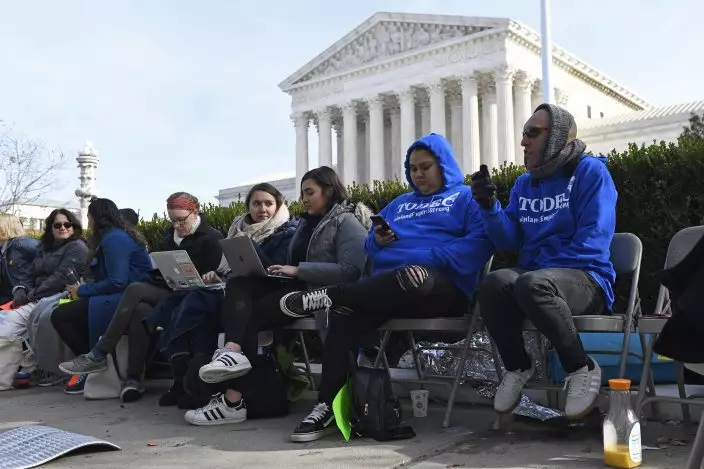
People wait in line outside the Supreme Court in Washington, Monday, Nov. 11, 2019, to be able to attend oral arguments in the case of President Trump's decision to end the Obama-era, Deferred Action for Childhood Arrivals program (DACA). (AP PhotoSusan Walsh)
Now it's up to the Supreme Court to say whether the way the administration has gone about trying to wind down DACA complies with federal law.
A decision is expected by June 2020, amid the presidential election campaign.
Some DACA recipients who are part of the lawsuit are expected to be in the courtroom for the arguments. People have been camping out in front of the court since the weekend for a chance to grab some of the few seats that are available to the general public. Chief Justice John Roberts has rejected a request for live or same-day audio of the arguments. The court will post the audio on its website .
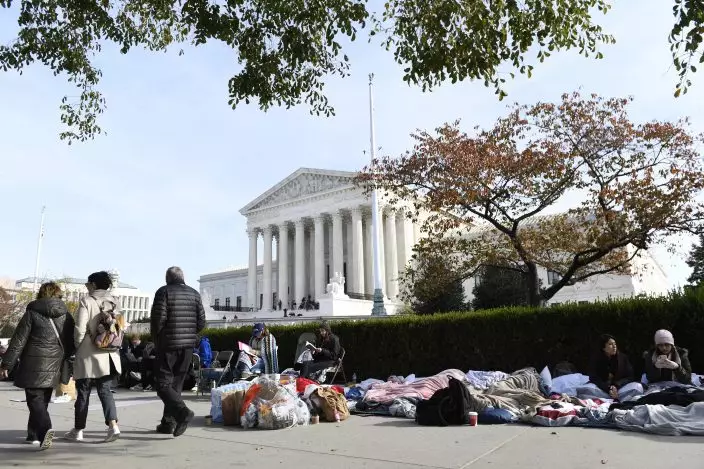
People wait in line outside the Supreme Court in Washington, Monday, Nov. 11, 2019, to be able to attend oral arguments in the case of President Trump's decision to end the Obama-era, Deferred Action for Childhood Arrivals program (DACA). (AP PhotoSusan Walsh)
A second case being argued Tuesday tests whether the parents of a Mexican teenager who was killed by a U.S. border patrol agent in a shooting across the southern border in El Paso, Texas, can sue the agent in American courts.
If the court agrees with the administration in the DACA case, Congress could put the program on surer legal footing. But the absence of comprehensive immigration reform from Congress is what prompted Obama to create DACA in 2012, giving people two-year renewable reprieves from the threat of deportation while also allowing them to work.
Federal courts struck down an expansion of DACA and the creation of similar protections for undocumented immigrants whose children are U.S. citizens.
Trump's anti-immigrant rhetoric was a key part of his presidential campaign in 2016, and his administration pointed to the invalidation of the expansion and the threat of a lawsuit against DACA by Texas and other Republican-led states as reasons to bring the program to a halt.
Young immigrants, civil rights groups, universities and Democratic-led cities and states sued to block the administration. They persuaded courts in New York, San Francisco and Washington, D.C., that the administration had been "arbitrary and capricious" in its actions, in violation of a federal law that requires policy changes be done in an orderly way.
Indeed, the high court case is not over whether DACA itself is legal, but instead the administration's approach to ending it.
UNITED NATIONS (AP) — The United States vetoed a widely backed U.N. resolution on Thursday that would have paved the way for full United Nations membership for Palestine, a goal the Palestinians have long sought.
The vote in the 15-member Security Council was 12 in favor, the United States opposed and two abstentions, from the United Kingdom and Switzerland. U.S. allies France, Japan and South Korea supported the resolution.
The resolution would have recommended that the 193-member General Assembly, where there are no vetoes, approve Palestine becoming the 194th member of the United Nations. Some 140 countries have already recognized Palestine, so its admission would have been approved, likely by a much higher number of countries.
U.S. deputy ambassador Robert Wood told the council the U.S. veto “does not reflect opposition to Palestinian statehood, but instead is an acknowledgment that it will only come from direct negotiations between the parties."
Before the vote, U.S. deputy State Department spokesman Vedant Patel said the United States has “been very clear consistently that premature actions in New York — even with the best intentions — will not achieve statehood for the Palestinian people.”
This is the second Palestinian attempt for full membership and it comes as the war in Gaza has put the more than 75-year-old Israeli-Palestinian conflict at center stage.
Palestinian President Mahmoud Abbas first delivered the Palestinian Authority’s application for U.N. membership in 2011. That bid failed because the Palestinians didn’t get the required minimum support of nine of the Security Council’s 15 members.
The Palestinians then went to the General Assembly, and by more than a two-thirds majority succeeded in having their status raised from a U.N. observer to a non-member observer state in November 2012. That opened the door for the Palestinian territories to join U.N. and other international organizations, including the International Criminal Court.
The strong support the Palestinians received Thursday reflects not only the growing number of countries recognizing their statehood but almost certainly the widespread global support for Palestinians caught in the war in Gaza, now in its seventh month.
Algeria’s U.N. Ambassador Amar Bendjama, the Arab representative on the council who introduced the resolution, called Palestine’s admission “a critical step toward rectifying a longstanding injustice" and said that “Peace will come from Palestine’s inclusion, not from its exclusion.”
In explaining the U.S. veto, Wood said there are “unresolved questions” on whether Palestine meets the criteria to be considered a state. He pointed to Hamas still exerting power and influence in the Gaza Strip, which is a key part of the state envisioned by the Palestinians.
Wood stressed the U.S. commitment to a two-state solution where Israel and Palestine live side-by-side in peace as the only path for both sides to live with security and for Israel to establish relations with all its Arab neighbors, including Saudi Arabia.
“The United States is committed to intensifying its engagement with the Palestinians and the rest of the region, not only to address the current crisis in Gaza, but to advance a political settlement that will create a path to Palestinian statehood and membership in the United Nations,” he said.
Ziad Abu Amr, special representative of the Palestinian president, said adopting the resolution would grant the Palestinian people hope “for a decent life within an independent state.”
He stressed to the Security Council that it wouldn't be an alternative “for serious negotiations that are time-bound to implement the two-state solution” and U.N. resolutions, and to resolve pending issues between Palestinians and Israelis.
“To grant the state of Palestine full membership will be an important pillar to achieve peace in our region, because the Palestinian-Israeli conflict and its different dimensions now goes beyond the borders of Palestine and Israel and impacts other regions in the Middle East and around the world,” the Palestinian envoy said before the vote.
Israeli-Palestinian negotiations have been stalled for years, and Israel’s right-wing government is dominated by hard-liners who oppose Palestinian statehood.
Israeli U.N. Ambassador Gilad Erdan called the resolution “disconnected to the reality on the ground” and warned that it “will cause only destruction for years to come and harm any chance for future dialogue.”
Six months after the Oct. 7 attack by Hamas, which controlled Gaza, and the killing of 1,200 people in “the most brutal massacre of Jews since the Holocaust,” he accused the Security Council of seeking “to reward the perpetrators of these atrocities with statehood.”
Israel’s military offensive in response has killed over 32,000 Palestinians, according to Gaza’s health ministry, and destroyed much of the territory.
Erdan listed the requirements for U.N. membership — accepting the obligations in the U.N. Charter and especially being a “peace-loving” state.
“What a joke,” he said. “Does anyone doubt that the Palestinians failed to meet these criteria? Did anyone hear any Palestinian leader even condemn the massacre of our children?”
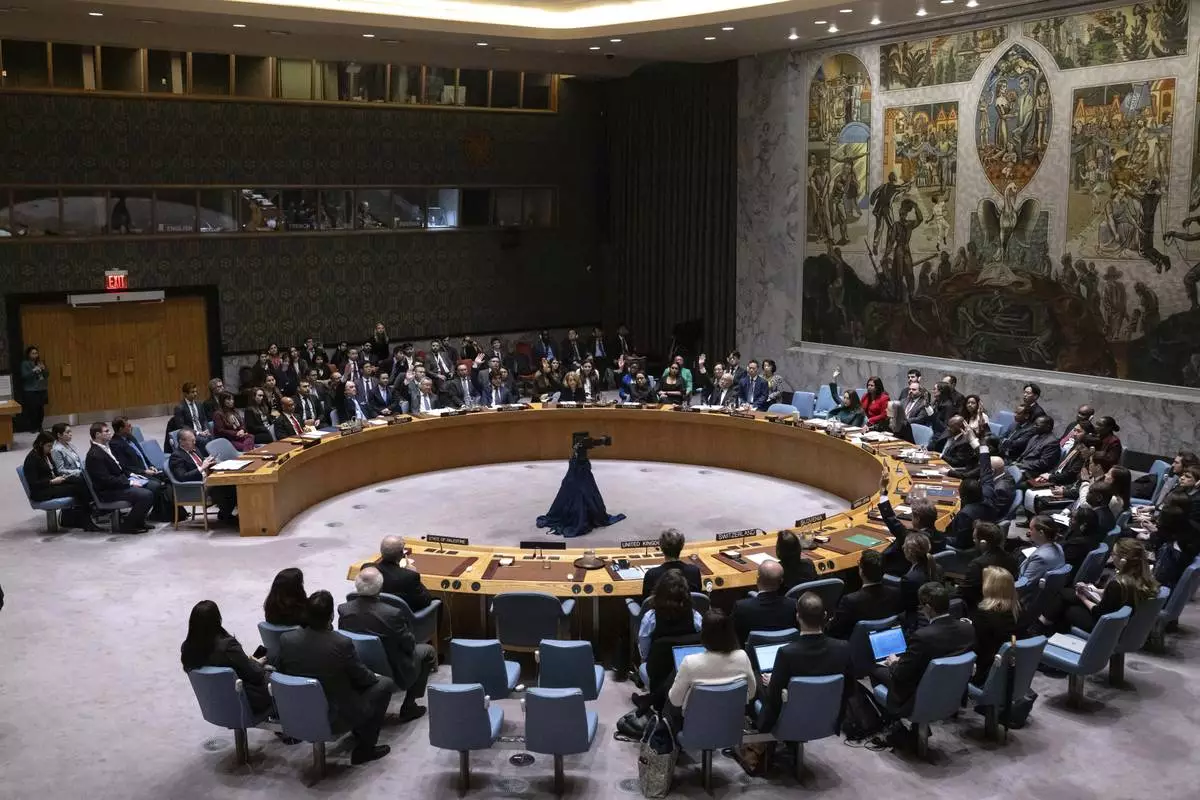
Representatives of member countries take votes during a Security Council meeting at United Nations headquarters, Thursday, April 18, 2024. (AP Photo/Yuki Iwamura)
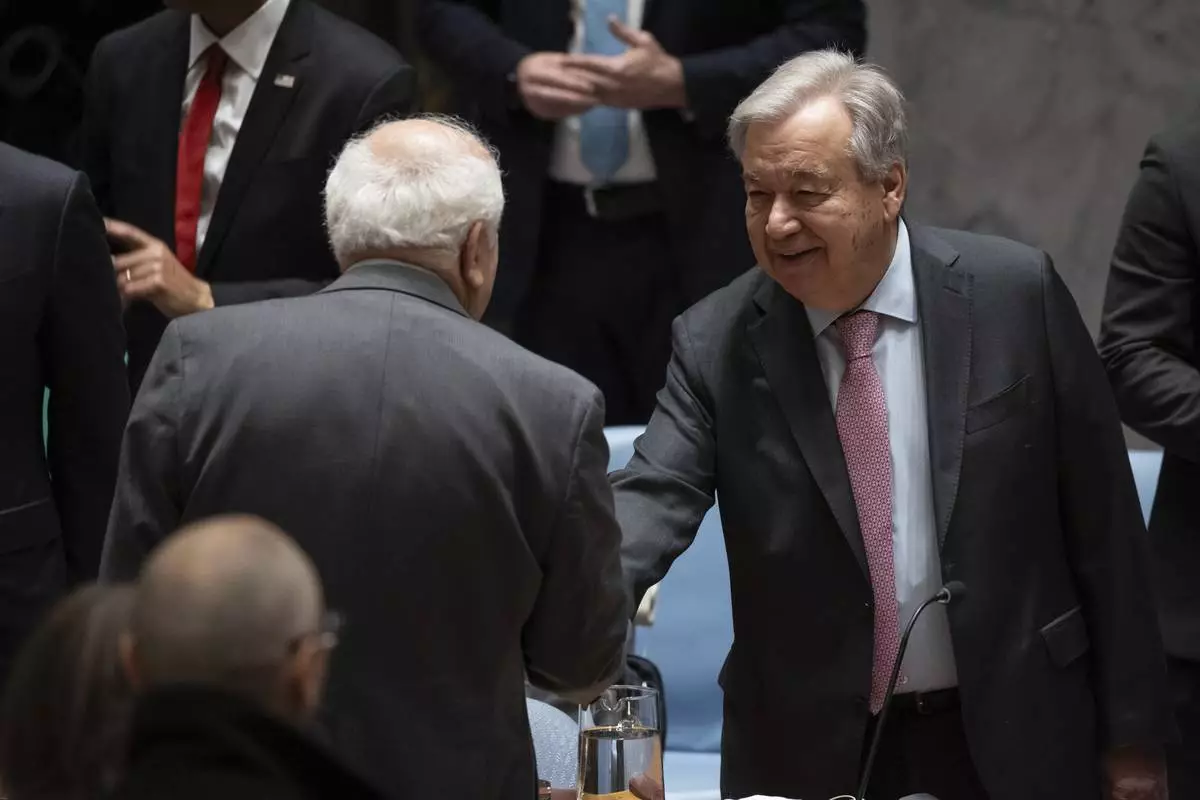
Palestinian Ambassador to the United Nations Riyad Mansour, left, and United Nations Secretary-General Antonio Guterres speak before a Security Council meeting at the United Nations headquarters, Thursday, April 18, 2024. (AP Photo/Yuki Iwamura)
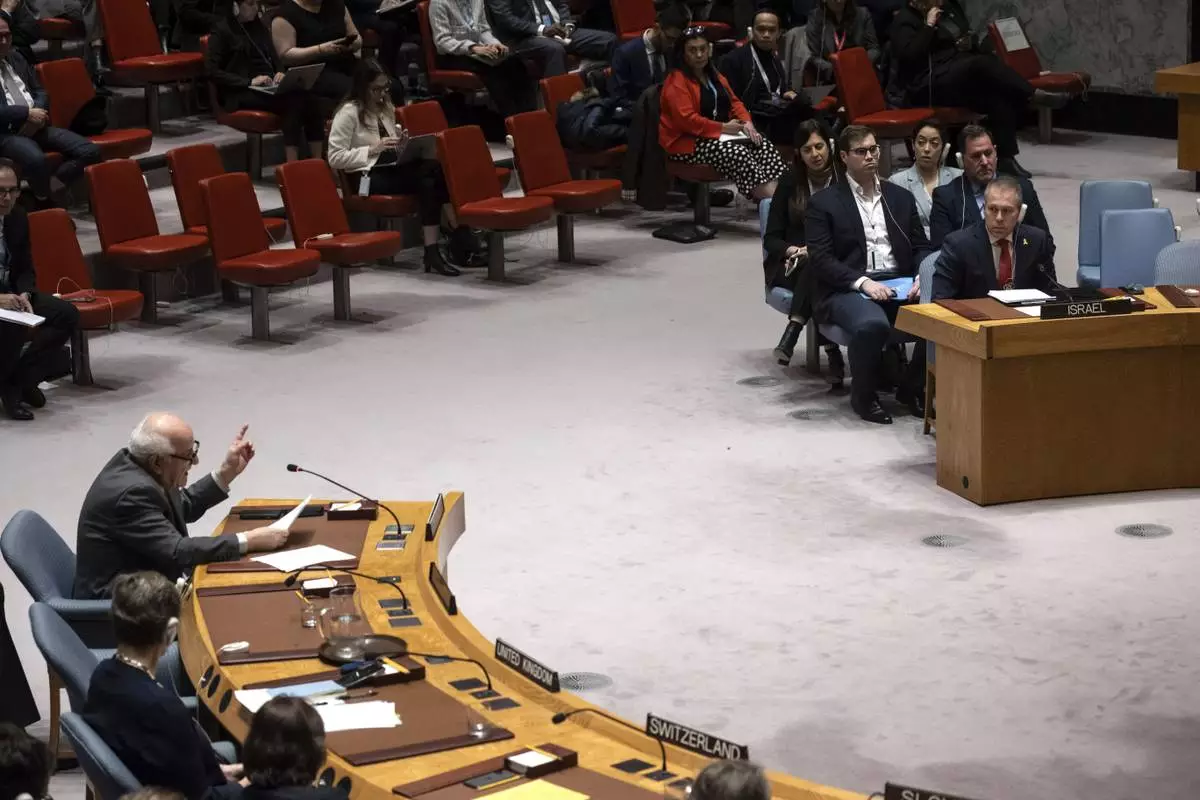
Palestinian Ambassador to the United Nations Riyad Mansour speaks during a Security Council meeting at United Nations headquarters, Thursday, April 18, 2024. (AP Photo/Yuki Iwamura)
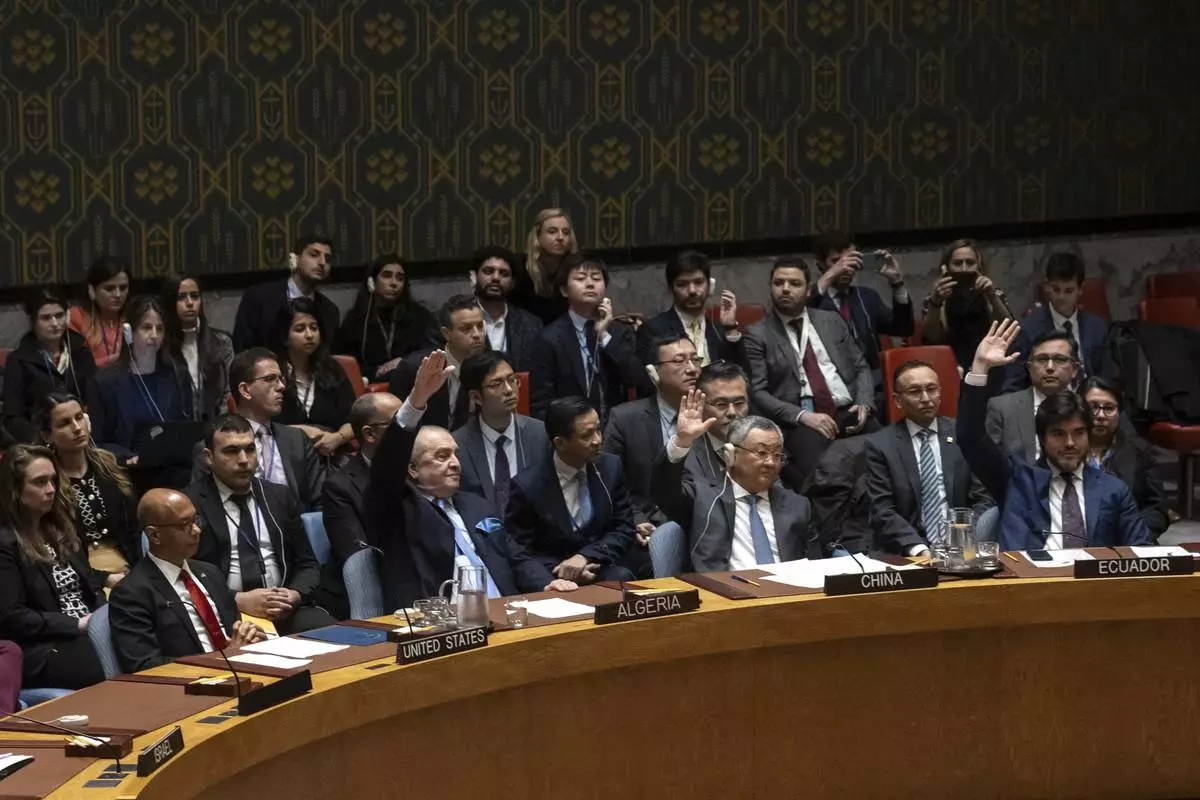
Representatives of member countries take votes during a Security Council meeting at United Nations headquarters, Thursday, April 18, 2024. (AP Photo/Yuki Iwamura)
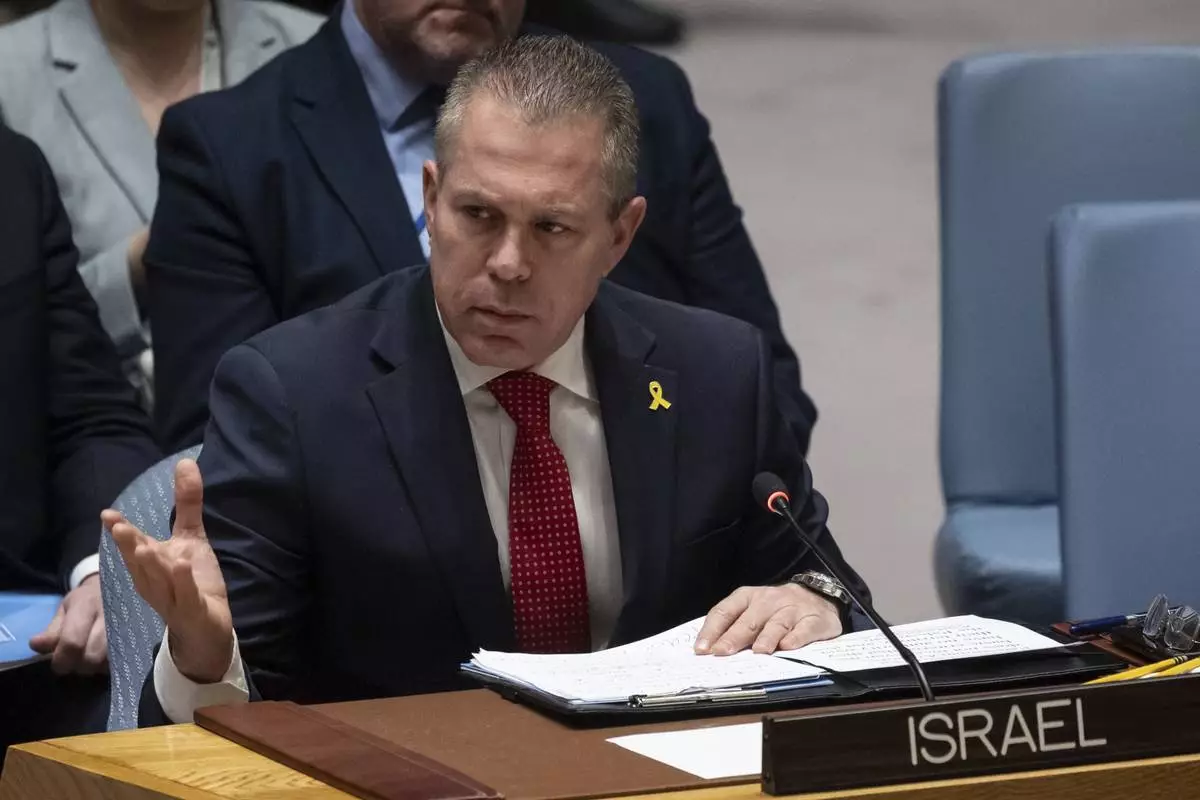
Israeli Ambassador to the United Nations Gilad Erdan speaks during a Security Council meeting at United Nations headquarters, Thursday, April 18, 2024. (AP Photo/Yuki Iwamura)
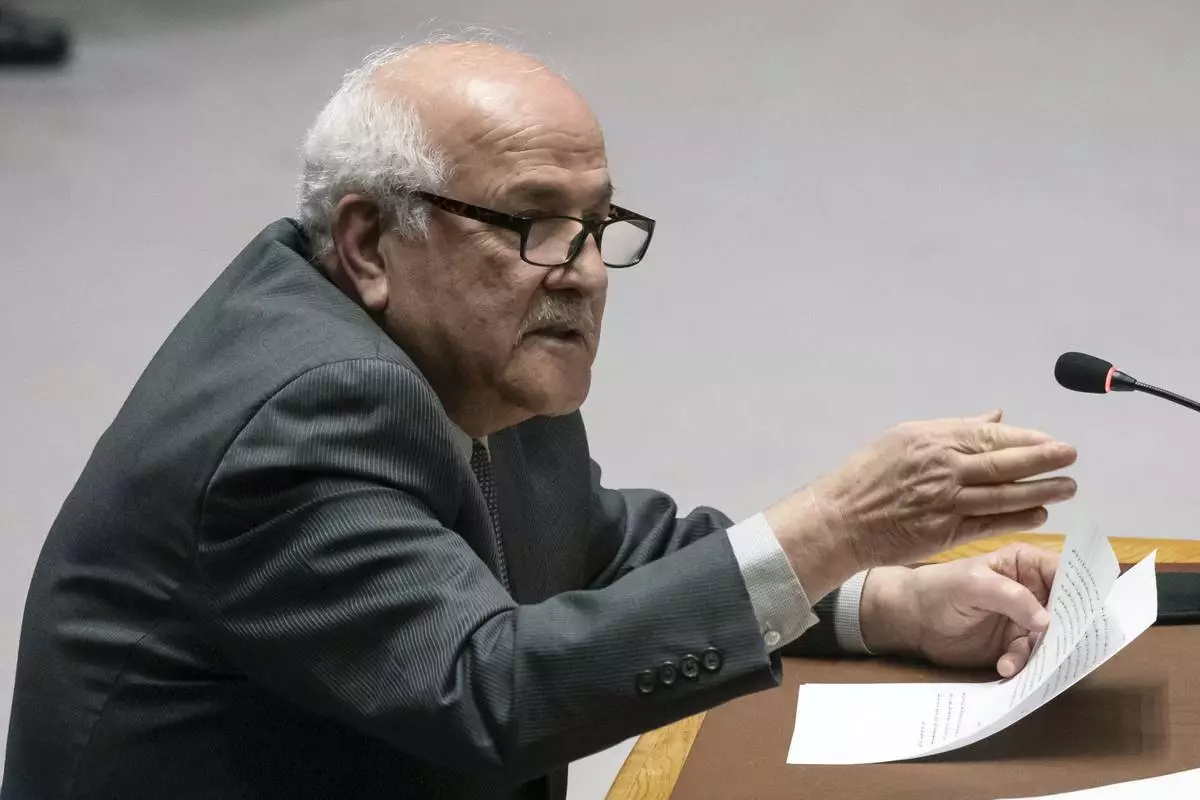
Palestinian Ambassador to the United Nations Riyad Mansour speaks during a Security Council meeting at United Nations headquarters, Thursday, April 18, 2024. (AP Photo/Yuki Iwamura)
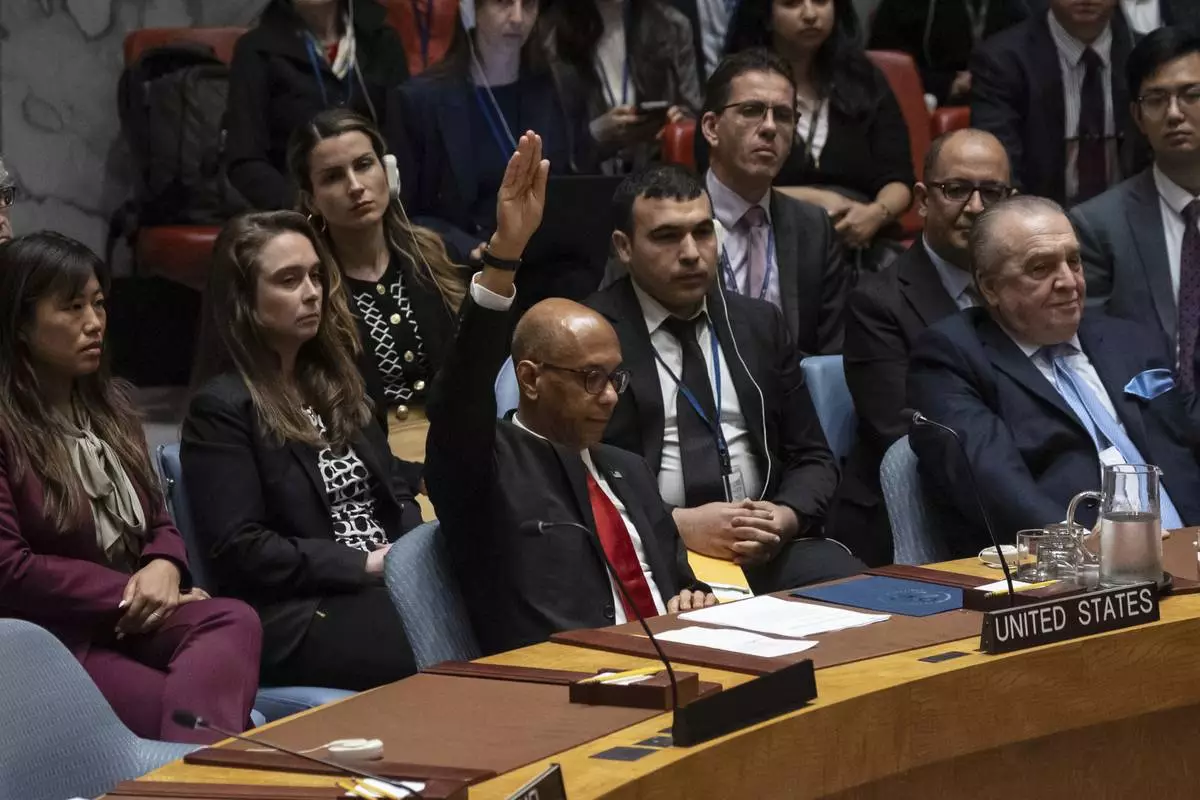
U.S. Deputy Ambassador Robert Wood votes against resolution during a Security Council meeting at United Nations headquarters, Thursday, April 18, 2024. (AP Photo/Yuki Iwamura)


















